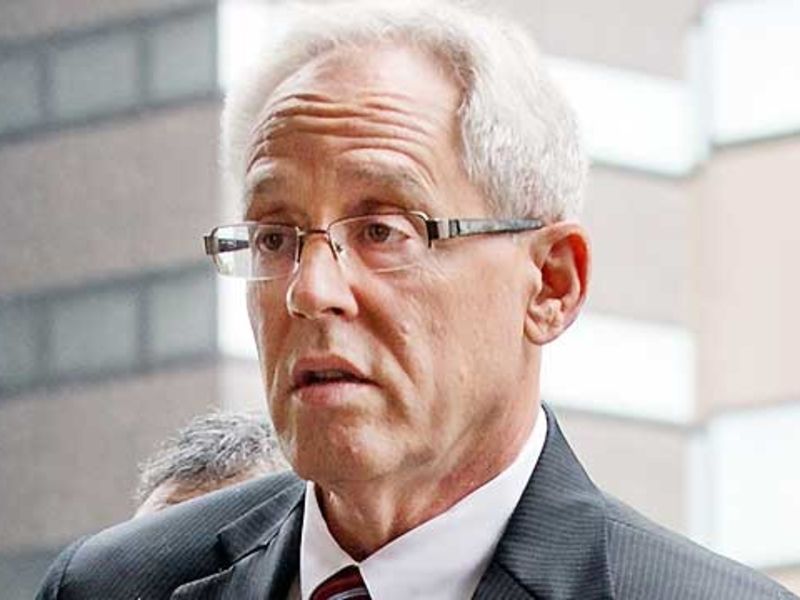
TOKYO — As an indication of the Japanese legal battle facing former Nissan director Greg Kelly, consider this grim fact: The judge presiding over Kelly’s case just sentenced a 90-year-old former senior government bureaucrat to five years in prison for negligence in a deadly car crash.
Veteran chief judge Kenji Shimotsu, who has overseen Kelly’s trial involving alleged financial misconduct for more than a year, handed down the punishment in that trial to a former government official who was found guilty of mistaking the accelerator for the brake as he plowed through a crowd in Tokyo, killing two people and injuring nine.
The judge said he was being lenient because the driver was at least not inebriated at the time, local media reported.
Even in law-and-order Japan, the sentence was deemed harsh.
Now, as Tokyo prosecutors made their closing argument against Kelly last week, they are asking Shimotsu to sentence the American to two years.
Kelly had faced a maximum penalty of 15 years in prison if found guilty of the charges. But prosecutors said they are being mindful of the time Kelly has already spent detained in Japan since his arrest nearly three years ago in November 2018.
After his arrest, Kelly was locked up for more than a month in a Tokyo jail before being released on bail. Since then, he has been barred from traveling outside the country.
Kelly’s wife, Dee, has moved to Japan to be with him during the legal fight and studies Japanese so that she can earn a student visa to stay in the country long term.
Kelly’s trial began Sept. 15, 2020, the day he turned 64, and the defense team will not make its closing argument until Oct. 27, with a verdict not expected until March 2022, according to his attorney.
The verdict will rest with the three-judge panel led by Shimotsu. He maintains a formal, businesslike demeanor and runs an efficient courtroom. He is often accommodating when court interpreters need more time to find the right words. And he is often seen gazing at the ceiling with his eyes open and head cocked, as if lost in deep philosophical thought while listening to arguments.
Kelly lead attorney Yoichi Kitamura said he isn’t worried about any hard-line reputation Shimotsu might have from the driving case, saying: ” I don’t think that is a precedent.”
Besides, Kitamura insists Kelly’s case won’t even get to sentencing. His client, he says, will first be cleared as innocent.
But prosecutors in a legal system that boasts a 99 percent conviction rate say otherwise.
In closing their case Sept. 29, prosecutor Yukio Kawasaki said it was clear that Kelly “conspired” with former Nissan Chairman Carlos Ghosn and others to falsify Nissan’s financial filings to understate Ghosn’s compensation by tens of millions of dollars.
“Kelly’s role was to study and prepare methods for the payment of this backdoor compensation,” he said.
“This case involves a criminal act that was well organized and conducted for an extended period of time while being strictly confidential, and its wrongfulness is quite grave,” the prosecutor said.
Prosecutors allege Ghosn, 67, and Kelly hid some $84 million in postponed compensation from 2010 to 2018. Both men, arrested the same day in 2018, deny any wrongdoing.
But after Ghosn fled Japan for Lebanon in 2019, Kelly, his longtime American human resources chief and a former director on the board, was left to fight the charges alone.
Kelly readily admits Ghosn took a massive pay cut to the tune of around half his salary in 2010 when Japan’s financial disclosure rules changed. According to Kelly, Ghosn feared that if the true scale of his Nissan paycheck were known, he would face withering backlash in France, where he was also chairman of Renault.
But prosecutors allege Nissan made a deal to pay back that salary shortfall — the amount Ghosn would have earned had he not taken the pay cut — thereby illegally skirting disclosure rules. The information was important to disclose for investors to make informed decisions and to have confidence in the corporate governance of Nissan, prosecutors said.
Kelly counters there was nothing to disclose, partly because no retirement deal was finalized.
The defense also argues that Kelly was working on a retirement package to be paid in retirement for work done in retirement. As such, the defense maintains, there would be no obligation to disclose the payout, and the charges would be moot.
In closing their case against Kelly, prosecutors said the retirement plans were simply a pretense to comp Ghosn for the pay cut he took in his last eight years at the helm.
“It is clear from objective evidence that there was the unpaid compensation for Ghosn,” Kawasaki said. “And it is also objectively clear that Kelly, based on Ghosn’s will, sought to pay a large sum of money to Ghosn without disclosing it in Nissan’s annual securities report.”
After last week’s hearing, Kelly lawyer Kitamura attacked the prosecutors’ case, saying that, among other things, they failed to establish a motive for Kelly’s alleged wrongdoing.
“We can refute everything the prosecutors said today,” Kitamura said.

